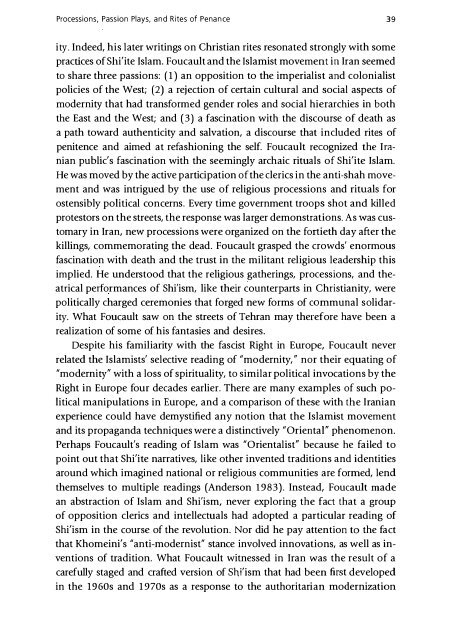foucault-and-the-iranian-revolution-janet-afary
foucault-and-the-iranian-revolution-janet-afary
foucault-and-the-iranian-revolution-janet-afary
You also want an ePaper? Increase the reach of your titles
YUMPU automatically turns print PDFs into web optimized ePapers that Google loves.
Processions, Passion Plays, <strong>and</strong> Rites of Penance 39<br />
ity. Indeed, his later writings on Christian rites resonated strongly with some<br />
practices ofShi'ite Islam. Foucault <strong>and</strong> <strong>the</strong> Islamist movement in Iran seemed<br />
to share three passions: (1) an opposition to <strong>the</strong> imperialist <strong>and</strong> colonialist<br />
policies of <strong>the</strong> West; (2) a rejection of certain cultural <strong>and</strong> social aspects of<br />
modernity that had transformed gender roles <strong>and</strong> social hierarchies in both<br />
<strong>the</strong> East <strong>and</strong> <strong>the</strong> West; <strong>and</strong> (3) a fascination with <strong>the</strong> discourse of death as<br />
a path toward au<strong>the</strong>nticity <strong>and</strong> salvation, a discourse that included rites of<br />
penitence <strong>and</strong> aimed at refashioning <strong>the</strong> self. Foucault recognized <strong>the</strong> Iranian<br />
public's fascination with <strong>the</strong> seemingly archaic rituals of Shi'ite Islam.<br />
He was moved by <strong>the</strong> active participation of <strong>the</strong> clerics in <strong>the</strong> anti -shah movement<br />
<strong>and</strong> was intrigued by <strong>the</strong> use of religious processions <strong>and</strong> rituals for<br />
ostensibly political concerns. Every time government troops shot <strong>and</strong> killed<br />
protestors on <strong>the</strong> streets, <strong>the</strong> response was larger demonstrations. As was customary<br />
in Iran, new processions were organized on <strong>the</strong> fortieth day after <strong>the</strong><br />
killings, commemorating <strong>the</strong> dead. Foucault grasped <strong>the</strong> crowds' enormous<br />
fascination with death <strong>and</strong> <strong>the</strong> trust in <strong>the</strong> militant religious leadership this<br />
implied. He understood that <strong>the</strong> religious ga<strong>the</strong>rings, processions, <strong>and</strong> <strong>the</strong>atrical<br />
performances of Shi'ism, like <strong>the</strong>ir counterparts in Christianity, were<br />
politically charged ceremonies that forged new forms of communal solidarity.<br />
What Foucault saw on <strong>the</strong> streets of Tehran may <strong>the</strong>refore have been a<br />
realization of some of his fantasies <strong>and</strong> desires.<br />
Despite his familiarity with <strong>the</strong> fascist Right in Europe, Foucault never<br />
related <strong>the</strong> Islamists' selective reading of "modernity, " nor <strong>the</strong>ir equating of<br />
"modernity" with a loss of spirituality, to similar political invocations by <strong>the</strong><br />
Right in Europe four decades earlier. There are many examples of such political<br />
manipulations in Europe, <strong>and</strong> a comparison of <strong>the</strong>se with <strong>the</strong> Iranian<br />
experience could have demystified any notion that <strong>the</strong> Islamist movement<br />
<strong>and</strong> its propag<strong>and</strong>a techniques were a distinctively "Oriental" phenomenon.<br />
Perhaps Foucault's reading of Islam was "Orientalist" because he failed to<br />
point out that Shi'ite narratives, like o<strong>the</strong>r invented traditions <strong>and</strong> identities<br />
around which imagined national or religious communities are formed, lend<br />
<strong>the</strong>mselves to multiple readings (Anderson 1983). Instead, Foucault made<br />
an abstraction of Islam <strong>and</strong> Shi'ism, never exploring <strong>the</strong> fact that a group<br />
of opposition clerics <strong>and</strong> intellectuals had adopted a particular reading of<br />
Shi'ism in <strong>the</strong> course of <strong>the</strong> <strong>revolution</strong>. Nor did he pay attention to <strong>the</strong> fa ct<br />
that Khomeini's "anti-modernist" stance involved innovations, as well as inventions<br />
of tradition. What Foucault witnessed in Iran was <strong>the</strong> result of a<br />
carefully staged <strong>and</strong> crafted version of Shi'ism that had been first developed<br />
in <strong>the</strong> 1960s <strong>and</strong> 1970s as a response to <strong>the</strong> authoritarian modernization


